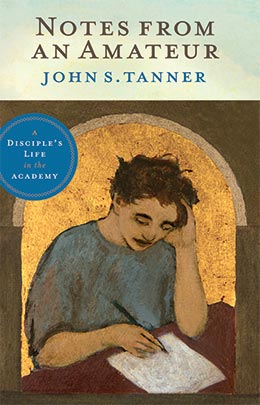In Praise of Praising
John S. Tanner, Notes from an Ameteur: A Disciple’s Life in the Academy (Provo, UT: Religious Studies Center; Salt Lake City: Deseret Book, 2011), 123–5.
As I write this, it is Thanksgiving morning. I just put the turkey in the oven. The rolls are molded, the house cleaned, the table set. Family and friends will arrive in a few hours. Then we will observe a family Thanksgiving tradition as each person takes candy corn from a dish and recounts this year’s blessings. After, we will feast together, on love as well as lunch.
Thanksgiving holds a special appeal for me. Less compromised by commercialism than any other major holiday, Thanksgiving still seems grounded in its original purpose. It is still a day for families and neighbors to share meals and give thanks. It is a distinctively American holiday with a unique genesis in our history. It is also a universal harvest feast akin to those celebrated by virtually all agricultural societies in every age.
I believe in giving thanks. It is good for the soul. Like mercy in Portia’s speech, thanksgiving is “twice blessed: It blesses him that gives and him that takes.” [1] This Thanksgiving season, my thoughts have been turned especially to how praising and thanking blesses those who give them. So today I write in praise of praising.
In Reflections on the Psalms, C. S. Lewis asks a fascinating question: why is it that religious people demand, and God commands, that we praise him? What satisfaction can God have in our praise? After all, Lewis quips, “I don’t want my dog to bark approval of my books.” This question leads Lewis to an important discovery about praise. We praise not merely to compliment one another but to complete our own enjoyment.
I had never noticed that all enjoyment spontaneously overflows into praise. . . . The world rings with praise—lovers praising their mistresses, readers their favourite poet, walkers praising the countryside, players praising their favourite game. . . . I had not noticed how the humblest, and at the same time most balanced and capacious, minds, praised most, while the cranks, misfits, and malcontents praised least. . . . Praise almost seems to be inner health made audible. . . . I think we delight to praise what we enjoy because the praise not merely expresses but completes the enjoyment; it is its appointed consummation. It is not out of compliment that lovers keep on telling one another how beautiful they are; the delight is incomplete till it is expressed. [2]
I like the thought that praise is the consummation of enjoyment. This is a consummation we ought to indulge in more often at BYU and in communities everywhere. As I said the other day in a talk to recently promoted faculty, we ought to be as ready to follow Paul’s injunction to “rejoice with them that do rejoice” as we are to “weep with them that weep” (Romans 12:15). To praise aright establishes communal norms about the good, the true, and the beautiful, just as to praise amiss degrades communities which “call good evil, and evil good” (Isaiah 5:20). To praise what truly deserves praise makes audible the inner health of institutions as well as individuals. Our halls should ring with praise and thanksgiving daily (see Alma 34:38).
As God ended each day of Creation with a benediction, President Henry B. Eyring has encouraged us to end every day in benediction, praise, and thanksgiving by asking, “Have I seen the hand of God reaching out to touch us or our children or our family today?” [3] Such reflection softens the heart and readies the soul for a harvest of faith. It links us with the pilgrims—those in Plymouth Bay and those who preceded them on a voyage to the promised land millennia before:
And they did sing praises unto the Lord; yea, the brother of Jared did sing praises unto the Lord, and he did thank and praise the Lord all the day long; and when the night came, they did not cease to praise the Lord. . . .
And they did land upon the shore of the promised land. And when they had set their feet upon the shores of the promised land they bowed themselves down upon the face of the land . . . and did shed tears of joy before the Lord, because of the multitude of his tender mercies over them. (Ether 6:9, 12)
Notes
[1] William Shakespeare, The Merchant of Venice, act 4, scene 1, 186–87, in The Riverside Shakespeare, 2nd ed. (Boston: Houghton-Mifflin, 1997), 310.
[2] C. S. Lewis, Reflections on the Psalms (San Diego: Harcourt Brace, 1986), 94.
[3] Henry B. Eyring, “O Remember, Remember,” Ensign, November 2007, 66.
